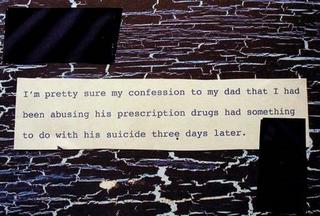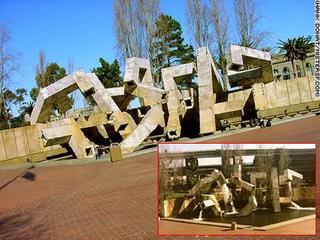liekly, entyr, psot? the lord giveth context and the lord can take it away. alternate defs:
liekly - a tangential manner of advancing. circumspect, surprising, wary. difficult to counter, or predict. cf. fungus, air-born diseases, the collected works of Robert Duncan, spam email, off-color jokes, guerrilla insurgencies.
entyr - a process, viewed at a distance, which appears to occur outside of / or on an edge of time. this may change when viewed at repeated, varying distances, as shadows change upon a well, or cross a wall.
psot - a bramble whose form bears both fruit and thorn, and in which the flatness of the open field is replaced with a densely curvilinear, thickly bracketted space. it is often disorienting, yet provides shelter and nourishment for many makes of small mammals.
-
well, as long as we aren't actually in the boats, or if we are and can swim, no big problem if they sink.
so shame, yes. and healing. and the gap - perceived - between healing work and writing life. what to say of it? the best words i know come from a zen roshi - he spoke about how dangerous zen practices of no-ego are for people who don't already have healthy egos. they are contraindicating, and end up wrecking the person rather than enriching them (or freeing them from these distinctions). so libratory for whom?
a boss just walked over to a colleague - wasn't sure if he was the (his) boss - but he projected that boss authority, that casual control one must earn here by position of authority. total ease, slow stroll in and starts to talk about "9 holes of golf this wknd" and you better believe that my co-worker immediately abandoned his work and turned hs full attention and charm to bear on THAT conversation.
now they are paracticing their swings and i am smiling like i am superior. isn't it sweet (orange, quince, port) that they are still boys, that in this shit they still enjoy things? a refuge from duty, either corporate or familial. and perhaps sweeter even in the retelling, where all negatives are erased - do not even appear - than in the moment of golfing, where the friction of the real world constantly intrudes or threatens to.
maybe. by quoting the roshi, i am casually and undogmatically equating the practice of writing with the practice of zen. are both nondual? in writing we explore the pliant pronouns, the ever-shift of i and we, stepping in and occupying their vacancy with characters, inexhaustible characters, but never ourselves. what we call ourselves is what? - our passing feelings, impulses, thoughts, perceptions and sensations. which, rendered, become other. teeth hurt, we watch a body pass, the brain and computer hard drive hum. the word "nigger", a memory of a grandmother, of a woman we once saw begging, of caked red dirt and rust on tin cans. in this, from this, with this always with us, we write.
yet, what force rises to shape or influence this current? we could call this organziaing force, this psychic corporation (to be gloriously unromantic) the ego. it rises up, yang, and embraces direction - dwarfed by the world flow, it yet plays active partner to it.
practice - zen, or writing, need both. in touch with the flow, and able to tweak it. in that order. a zen garden is beautiful in its allowing of natural forms their autonomy without surrendering the role of the pruners, the rake, a shovel scraping up dirt.
i am in to therapy and healing because my ego is in such marginal shape that it is exceedingly hard work just not to cry or otherwise explode at work. ie, to "keep up appearances". but more - to have a healthy relationship to my workplace (which is horribly repressed, making actually healthy minor explosions of tears and swear words inadvisable and threatening). i immediately doubt that. but... butt... oh the argument comes unhinged. i do try.
i trust dialectic arguments more than any other. sex is a dialectic, as is love, war, and good target spitting. the tension and juxtaposing of non-identical (if not neccessarily diametrically opposed, that old reductionist binary opposition) forces creates frictions, eddies, currents much like Earth's weather and landforms - ie places to inhabit. places i might live a rich and satisfying life.
to the extent that therapy and healing offer an entrance into this dialectic, yes.to the extent that writing and reading creative work offers an entrance into this dialectic, yes.
neither is perfect. i am at home in neither, but can move through both, i may be, for a few moments, really at home in either. they take turns. i feel stuck by this language, these terms. home invites homelessness - is that opposition relevant? i feel compelled to explore it, and i am not going to.
be compelled. to discover our autonomy, and then exercise is it wisely, with compassion, w/o attachment. that seems a worthy and noble end. that autonomy is perceived semiotically, through sign systems, which we learn to read. language is one of these. to be articulate, to lay it down, no BS, that, to me, is healing. or one element of it. to lay it down, to open to it, to follow unknowable desires and become intimate w/ them... i think this is possible in both language work and (professionally conceived) healing work.
rambling. like a good patch of briars. the trail snakes through, though you may cut your hand or snare your shirt.
i think healing practices can catch and snare the shirt, which is not healing. i think the same of language, its work. maybe it IS healing. doesn't it depend (on the greater web)?
so we navigate both. memoir invites and demands anti-memoir. i would say that is healing too - memoir is a construct, a tool in an ideology whose aim is codification, a solid understanding ( a firm grip on the situation) which beds easily with control, and with reductive thinking. it need not, it is just a tool - anti-memoir, the study of what we leave out of our tidy or messy presentations of self, is the shadow work. bringing both into play, a field is generated, sky above, earth below, fruitful green zone of living things between. a home, an ecology, a series of traceries, superhighway routes thru, nexuses and nodes where a banana or grape might grow or a love one dropped off on the bus.
think think think. not to deny the daily experience of shame - which i have. shame at imperfection. when i practice it, i start here, i say, yeah, i feel a lot of shame at being "so fucked up". i even feel shame at wanting to heal, at believing in healing, shame for being weak and then shame for wanting "strong". its bizarre. it can keep me back/keep me down. ie silent, and a traitor to my strongest desires, most basic/burning questions. but if i bring the secret out into the open - thing i most fear - it changes. it may return, but it changes. it loses its grip, becomes something else. i can write that.
this weird slippy slope "between" knowing who i am and being open to who/how i might be(come). ego and its edge. its so hard for me to be there. i dont know where it goes. i dont know how it might be a "career" so i dont go hungry/in rags. a long email. as to others who will not hear us - yes. but here is a good bernstein quote i just found, pointing to risks either way:
Mr. Bernstein, for his part, readily concedes the many difficulties of "Shadowtime," and argues that they arise not only by design but by necessity. "Clarity is valuable in many situations, but not necessarily in art," he said in a recent interview at his Manhattan apartment. "Many will no doubt be befuddled, just as a work that seeks to be clear risks boring people. These are the risks you have to take."
Yet more seems to be at stake than simply keeping an audience challenged. When pressed, Mr. Bernstein echoes Benjamin's friend and colleague Theodor Adorno, who defended difficult music as having its own social value precisely because it teaches us how to withhold understanding and therefore helps us resist the allure of false clarity in the world beyond the concert hall. Complexity, in other words, is a worthy ideal in art because reality is even more complex and dissonant than the thorniest work of modernism, even if politicians and the commercial culture reassure us that everything is simple, clear and harmonious.
how does therapy move beyond the singular individual to address the disharmonies and false harmonies or even the repression of actual harmonies (we all play the same note NOW - smile, how are you, i'm fine. have you tried pepsident?) in the social sphere, our culture life, the womb in which each of our little worm identies nestles and thrives (or no). i am thinking of the first Matrix - the process of waking up invariably involves moving into a confrontation with the demands (intrusions) of our culture over our life, our language, our desires.
ie. the need for money. fame. a nice hot body. in the latest clothes, with a highspeed wireless connection. and fabulously intelligent. clever, compassionate, sexy, wry wise - I DEMAND OF YOU TO BE.
perhaps we can start with noting how these worlds do and don't intersect. perhaps we can bring them into conversation. we could start with bodies, and how bodies emerge into signs. for a writer, words. perhaps we can acknowledge our different projects, their overlaps, and start here, from this. trusting ourselves and eachother to move deeply and fully into... into what? does it have a name? our desires? our paths? if we can weave a world, and words, of this trust, this knowledge... is that our home?
and here i feel still a little shame for hoping "yes", for wanting to conclude, as if its a hoax, as if how could i pretend that this has anywhere "to go", anything to "clear up" or "illumine". for a few moments, we stare into the gap. our eyes, somehow, adjust.
and we do the box thing? (pleese do not call eet the box thing)
i have no idea if there is any food or threat here for you to ponder. if so, send the little boats back. they're sturdier than the depression thought them.




